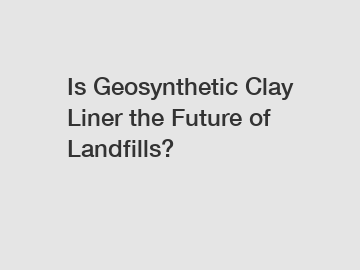Is Geosynthetic Clay Liner the Future of Landfills?
Landfills play a crucial role in our society as they are necessary for the disposal of waste materials that cannot be recycled or composted. However, traditional landfills pose significant environmental risks due to their potential to contaminate soil and water sources. To combat these issues, researchers and engineers have been exploring new technologies such as Geosynthetic Clay Liners (GCLs) as a potential solution for the future of landfills.
But what exactly is a Geosynthetic Clay Liner and why is it being considered as the future of landfills? Let's dive into the details of this innovative technology.
Geosynthetic Clay Liners are engineered materials that consist of a layer of bentonite clay sandwiched between two geotextiles. Bentonite is a natural clay mineral known for its high swelling capacity and low permeability, making it an ideal material for lining landfills. The geotextiles provide additional strength to the liner and prevent the clay from migrating or being washed away.

One of the key benefits of using GCLs in landfills is their superior containment properties. The bentonite clay in the liner acts as a barrier to prevent the migration of leachate, which is the liquid that forms as waste decomposes. By effectively isolating the waste from the surrounding environment, GCLs help to minimize the risk of contamination and protect groundwater sources.
In addition to their containment properties, GCLs are also highly durable and resistance to punctures and tears. This ensures that the integrity of the liner is maintained over time, even in harsh environmental conditions. As a result, GCLs have a longer lifespan compared to traditional landfill liners, reducing the need for costly repairs and maintenance.
Furthermore, GCLs are also easy to install and can be customized to meet the specific requirements of a landfill site. Their flexibility and adaptability make them a versatile option for a wide range of landfill applications, from small containment areas to large-scale disposal sites.
But perhaps the most compelling reason why Geosynthetic Clay Liners are considered the future of landfills is their sustainability and environmental benefits. Unlike traditional liners made of plastic or rubber, GCLs are made from natural materials that are non-toxic and biodegradable. This reduces the environmental impact of landfill construction and operation, aligning with the principles of sustainability and eco-friendliness.
Moreover, the use of GCLs in landfills can also help to minimize greenhouse gas emissions and reduce the carbon footprint of waste disposal. By effectively containing organic waste and preventing it from decomposing in an anaerobic environment, GCLs can help to capture and utilize methane gas as a renewable energy source. This not only reduces the environmental impact of landfills but also contributes to the shift towards a more sustainable and circular economy.
In conclusion, Geosynthetic Clay Liners show great promise as the future of landfills due to their superior containment properties, durability, sustainability, and environmental benefits. As we continue to seek innovative solutions to manage our waste more effectively and responsibly, GCLs are likely to play a significant role in shaping the future of waste management practices.
By investing in the development and implementation of Geosynthetic Clay Liners, we can create safer, more efficient, and more environmentally-friendly landfills that protect our natural resources and promote a healthier future for generations to come. The potential of GCLs is undeniable, and it is clear that this innovative technology has the potential to revolutionize the way we think about landfill design and operation.
Contact us to discuss your requirements of concrete protective liners manufacturer, geogrid manufacturer custom, geotube exporter china. Our experienced sales team can help you identify the options that best suit your needs.


